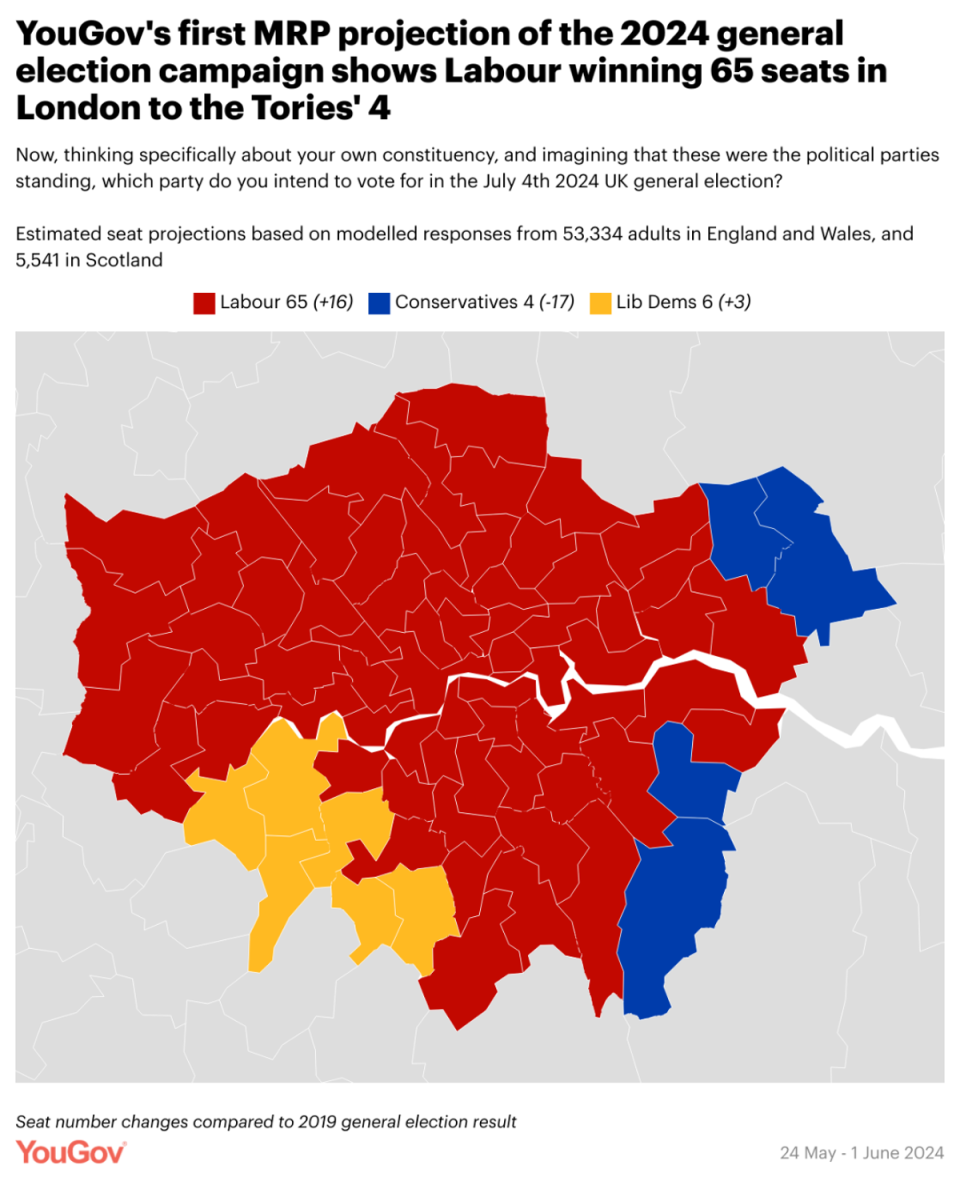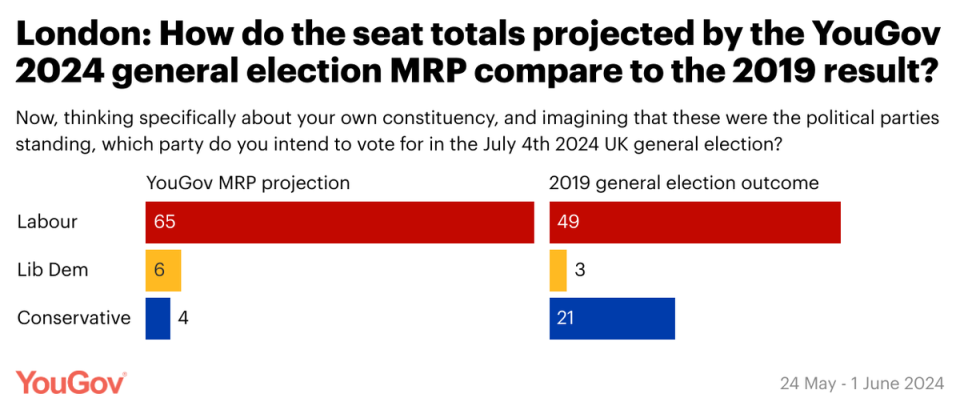Double hammer blow for Sunak as Farage becomes Reform leader and poll shows historic landslide win for Labour

Rishi Sunak suffered a double hammer blow as Nigel Farage took over as Reform leader and a new poll showed Labour storming to a historic general election win bigger than Tony Blair’s.
The Prime Minister’s efforts to inject fresh momentum into the Tory campaign at the start of the week were brutally shredded at 4pm by Mr Farage swaggering back into the political centre stage of British politics.
Just an hour later, a YouGov survey showed Sir Keir Starmer heading to No10 with Labour set to get a massive majority of 194, the highest number since Stanley Baldwin won a majority of 208 in 1924 and more than Tony Blair’s 179 in 1997.
The Tories would be crushed, losing 232 seats and dropping to just 140, according to YouGov’s projection.
In London, they would be almost wiped out, seeing their number of seats plummet from 21 to just four.
There would be not a single Conservative MP left in Inner London for the first time ever.
But it is Mr Farage’s U-turn, having said he would not play a major role in the election, which will panic many Tory candidates.
The new Reform UK leader swiftly went to war with the Tories over immigration and Europe.
He also said he would spend far less time than planned in America on Donald Trump’s campaign trail if he becomes an MP.
Conservative MPs will now face a battle on two fronts, with Reform UK on the Right, and Labour and the Liberal Democrats on the Left.
The devastating poll predicts the Tories could be completed gone from Inner London, losing Cities of London and Westminster, Chelsea and Fulham, and the new seat of Kensington and Bayswater.
All these seats would go to Labour, which would see its total number of constituencies rise from 49 to 65.
Former Tory leader Iain Duncan Smith would lose to Labour in Chingford and Woodford Green, as would Steve Tuckwell, in Boris Johnson’s former constituency of Uxbridge and South Ruislip.
The Liberal Democrats would gain three, to six, including Wimbledon, Carshalton and Wallington, and Sutton and Cheam.

Just outside London, they would seize Esher and Walton which was represented by former Foreign Secretary Dominic Raab.
The poll findings did not take account of Jeremy Corbyn running as an Independent in Islington North.

Nationally, Labour would gain 422 seats, the Conservatives would be reduced to just 140, the Liberal Democrats would get 48, the Scottish National Party 17, Plaid Cymure two and Greens two.
So Labour would get a majority of 194, bigger than Tony Blair’s of 179 in 1997.
The fieldwork was also carried out before Nigel Farage announced he was taking over as leader of Reform UK which is another major blow to Mr Sunak.
The poll put the careers of many Tory Cabinet ministers at risk.
Chancellor Jeremy Hunt, Defence Secretary Grant Shapps, Commons Leader Penny Mordaunt, Justice Secretary Alex Chalk, Attorney General Victoria Prentis, Welsh Secretary David Davies and Johnny Mercer, the armed forces minister sitting in the Cabinet, are all on course to lose their seats under the YouGov projection.
For others in Home Counties constituencies, Northern Ireland minister Steve Baker (Wycombe) and Economic Secretary to the Treasury Bim Afolami (Hitchin) are also deemed in danger.
Only one member of Labour’s shadow cabinet is also at risk under the projection: shadow culture secretary Thangham Debonnaire is fighting a tight race with the Greens in Bristol Central.
The large-scale research is not a typical survey but a "Multi-level Regression and Post-stratification (MRP)" model.
That uses existing polling data to extrapolate expected results across every UK constituency on July 4.
The projection for Labour would be the highest number of seats of any party since Stanley Baldwin won a Conservative majority of 208 in 1924.
YouGov said its MRP model had been benchmarked to correctly estimate the 2019 General Election result to within a couple of seats of each party’s actual performance then. It has been used to successfully predict elections as recently as Spain's in July 2023, the company said.

 Yahoo News
Yahoo News 
